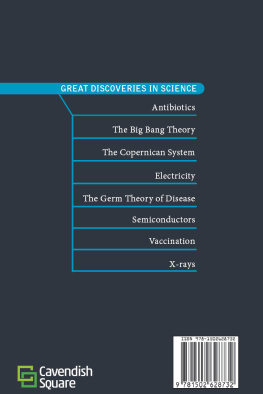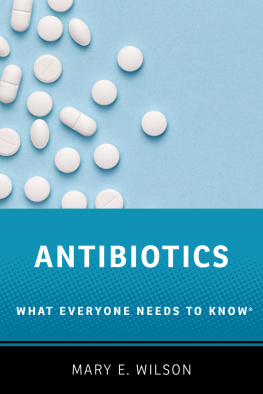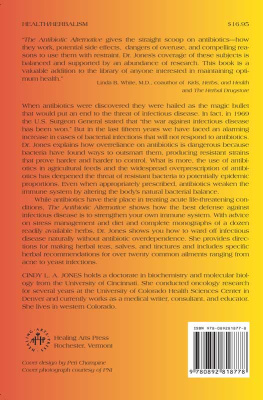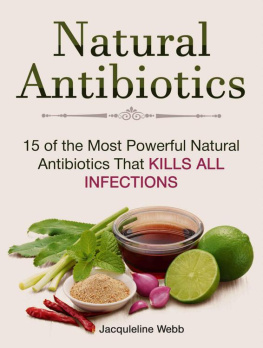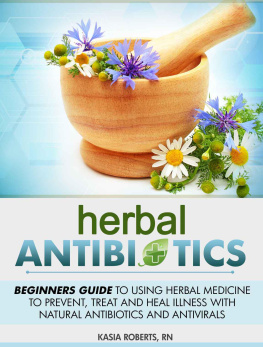GREAT DISCOVERIES IN SCIENCE
Antibiotics
Jonathan S. Adams
Published in 2018 by Cavendish Square Publishing, LLC
243 5th Avenue, Suite 136, New York, NY 10016
Copyright 2018 by Cavendish Square Publishing, LLC
First Edition
No part of this publication may be reproduced, stored in a retrieval system, or transmitted in any form or by any meanselectronic, mechanical, photocopying, recording, or otherwisewithout the prior permission of the copyright owner. Request for permission should be addressed to Permissions, Cavendish Square Publishing, 243 5th Avenue, Suite 136, New York, NY 10016.
Tel (877) 980-4450; fax (877) 980-4454.
Website: cavendishsq.com
This publication represents the opinions and views of the author based on his or her personal experience, knowledge, and research. The information in this book serves as a general guide only. The author and publisher have used their best efforts in preparing this book and disclaim liability rising directly or indirectly from the use and application of this book.
CPSIA Compliance Information: Batch #CS17CSQ
All websites were available and accurate when this book was sent to press.
Library of Congress Cataloging-in-Publication Data
Names: Adams, Jonathan S., 1961
Title: Antibiotics / Jonathan S. Adams.
Description: New York : Cavendish Square Publishing, [2018] | Series: Great discoveries in science | Includes bibliographical references and index.
Identifiers: LCCN 2016055340 (print) | LCCN 2016058116 (ebook) | ISBN 9781502628732 (library bound) | ISBN 9781502628749 (E-book)
Subjects: LCSH: Antibiotics. | Communicable diseases--Treatment. | Penicillin.
Classification: LCC RM265 .A33 2018 (print) | LCC RM265 (ebook) | DDC 615.7/922--dc23
LC record available at https://lccn.loc.gov/2016055340
Editorial Director: David McNamara
Editor: Caitlyn Miller
Copy Editor: Michele Suchomel-Casey
Associate Art Director: Amy Greenan
Designer: Lindsey Auten
Production Coordinator: Karol Szymczuk
Photo Research: J8 Media
The photographs in this book are used by permission and through the courtesy of: Cover Science Pasieka/Science Photo Library/ Getty Images; p. 52 Science Photo Library/Getty Images; pp. 53, 54 BSIP/Universal Images Group/Getty Images.
Printed in the United States of America
Before antibiotics, hospital wards like this one in 1890 sought to relieve suffering but offered few cures for common diseases.
ANTIBIOTICS
Introduction: Medical Miracles
T he discovery of antibiotics, perhaps the most momentous discovery in the history of medicine, did not come about because of something dramatic that a brilliant scientist did. The discovery of an effective way to fight the deadly infections that plague humankind came about largely because of something that scientist did not do.
In 1928, Alexander Fleming went on vacation. That was not surprising; he earned a good living treating patients in addition to his laboratory research at Saint Marys Hospital in London, and he loved to putter around the garden of his country house. But the world would have been a far different and far more dangerous place had he decided instead to remain in his cluttered laboratory and keep on working.
What Alexander Fleming found when he returned to London changed the world more dramatically than any other medical discovery. But it did not come out of nowhere, and it did not happen in a brilliant flash of insight that revealed a previously unknown reality. In fact, it was a discovery that was decades, even centuries, in the making, and it would take more than a decade of painstaking, incremental problem solving to move what Fleming saw that autumn day from the laboratory bench to the hospital ward.
It is not unreasonable to divide all of human history in two, before the discovery of antibiotics and after. The world before antibiotics is so foreign to us now that it is almost impossible to imagine. Then, the simplest, most insignificant event could prove deadly: the prick of a pin or the scratch of a thorn. Wars killed millions, not because of the wounds suffered in battle, but because of the infections that followed. Hospitals, far from being places where people went to recover from their illness with the help of the most sophisticated medical science, were places that people went to die.
Antibiotics changed all that. They were the true miracle drugs, the magic bullets. Their discovery, however, came about almost entirely by accident, a series of fortunate events that saved countless lives but could just as easily have led down another of the many dead ends scientists pursued during the long search for a weapon to fight the microbes that cause disease.
The story does not begin or end with Alexander Fleming. In fact, Fleming himself plays a crucial but relatively small role. The story actually begins in ancient societies like Jordan and China, when people realized that eating a particular plant could treat illness or that rubbing a particular type of soil on your skin could treat an infection.
The story continues in Holland in 1675. A tradesman and scientist named Antonie van Leeuwenhoek wanted a better look at the tiny threads he used in his drapers shop, so he cobbled together a homemade instrument with a metal tube and a powerful glass lens he made himself. Pleased with the result, he began looking at other things, such as his own tears. He saw, to his horror and amazement, that he shared his body with millions of tiny creatures that no one had ever seen before. He called them animalcules, Latin for tiny animals. We know them today as bacteria.
More than a century later, in England, milkmaids on occasion developed pustules on their hands after touching the udders of cows infected with a mild illness called cowpox. Far more important, milkmaids who had come down with cowpox were immune to a related disease, smallpox, which was the leading killer of the day. Edward Jenner, a physician, postulated that if he took the pus from a cowpox lesion and injected it into a healthy person, that person would get slightly ill but would thereafter be immune to smallpox. He was right, and vaccines were born.
Jenner invented a vaccine but he did not know why it worked. That discovery would take nearly another century, when Louis Pasteur realized that if he weakened but did not kill bacteria he could protect against later infection. That advance, together with another just a few years later proving that bacteria and viruses were the cause of disease, was the final building block for modern medical science. The stage was set for antibiotics to make their accidental appearance in Alexander Flemings laboratory.
Flemings genius was to understand he had found something remarkable, and he refused to give up. But he was unable to take the next step and transform his discovery into lifesaving medicine. That would come more than ten years later through the diligence and insight of three mismatched scientists: Howard Florey, Ernst Chain, and Norman Heatley.
The story of the discovery of antibiotics is as dramatic and important as any in the history of science.
E. colisickens more than 250,000 people a year in the United States alone.
Next page
